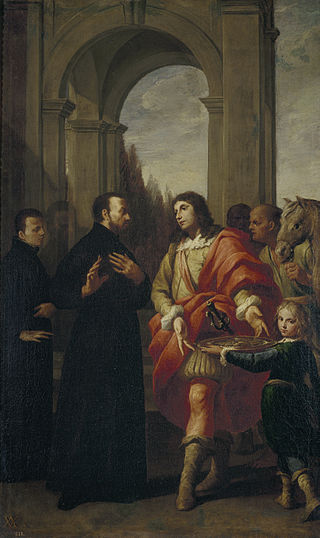Maria is a feminine given name. It is given in many languages influenced by Latin Christianity.
Adalbert is a German given name which means "noble bright" or "noble shining", derived from the words adal and berht. Alternative spellings include Adelbart, Adelbert and Adalberto. Derivative names include Albert and Elbert.

Adolf is a given name with German origins.

The Theatines, officially named the Congregation of Clerics Regular, is a Catholic order of clerics regular of pontifical right for men founded by Archbishop Gian Pietro Carafa on 14 September 1524.
Wenzel is a male given name as the German and Old English form of the Czech given name Václav or Venceslav, meaning "praised with glory". Variations are Вячеслав, Vencel (Hungarian), Wacław, Więcław, Wiesław (Polish), Venceslas/Wenceslas (French), Venceslao (Italian), Venceslau (Portuguese), Wenceslao (Spanish).

Gaetano is an Italian masculine given name. It is also used as a surname. It is derived from the Latin Caietanus, meaning "from Caieta". The given name has been in use in Italy since medieval period, although it also remained in use as a byname indicating people from Gaeta, as in Thomas Cajetan or Gaetanus (1469–1534). The modern given name can be traced to Saint Gaetano dei Conti di Tiene (1480–1547) who was canonized in 1671. Other variants of the name exist in other Romance languages, the French form of the name is Gaëtan, Gaétan, the Portuguese form is Caetano, and the Spanish form is Cayetano. The feminine form is Gaetana.
Urban as a given name or surname may refer to:
Egon is a variant of the male given name Eugene. It is most commonly found in Austria, the Czech Republic, Germany, Estonia, Hungary, Slovakia, Sweden, Denmark, and parts of the Netherlands and Belgium. The name can also be derived from the Germanic element egin which means "sword, blade". Egon may refer to:
Alois is an Old Occitan form of the name Louis. Modern variants include Aloïs (French), Aloys (German), Alois (Czech), Alojz, Alojzy (Polish), Aloísio, and Alajos (Hungarian).
Řezníček is a Czech surname, meaning "little butcher".
Cayetano is a Spanish and sometimes Sephardic Jewish name related to the Italian name Gaetano, both from Latin Caietanus, meaning "from Gaeta". It is a common given name in Spain, Mexico, Argentina and the Philippines. As a surname, it is also found predominantly in those countries, as well as Peru. The feminine version of the name is Cayetana.

Barbara is a given name used in numerous languages. It is the feminine form of the Greek word barbaros meaning "stranger" or "foreign".

Karl Kajetan von Gaisruck was an Austrian Cardinal and the archbishop of Milan from 1816 to 1846. He also held the title of Graf or Count.
Albin is a masculine Polish, Scandinavian, German, French and Slovenian given name, from the Roman cognate Albinus, derived from the Latin albus, meaning "white" or "bright". This name may also be a last name. In Estonia, France, Hungary, Poland, Slovakia, and Sweden March 1 is Albin's Name day. There are variant spellings, including Albinas, a male given name in Lithuania; Aubin, a French masculine given name; and Albina, an Ancient Roman, Czech, Galician, Italian, Polish, Slovak, and Slovenian feminine given name. Albin is uncommon as a surname. People with the given name Albin include:
Elizabeth is a feminine given name, a variation of the Hebrew name Elisheva (אֱלִישֶׁבַע), meaning "My God is an oath" or "My God is abundance", as rendered in the Septuagint.

Leopold is the modern form of the Germanic name Luitbald, composed of two stems, common to Germanic names. The first part is related to Old High German liut meaning "people", the second part bald or balt is of Germanic origin and means "brave". The name is not related to the names Leon and Leonard which mean lion. The name gradually spread across Western Europe and during the 16th century it became popular in the southern Holy Roman Empire, due to the influence of the Margraves of Austria from the Babenberg dynasty.
Rosa is a female given name, especially in the Portuguese, Italian, Serbian and Spanish languages.
Rosa is a surname with multiple etymologies. In Italian and Catalan, it means "rose" (flower). It is also a Portuguese and Spanish language surname. Variants include Da Rosa or da Rosa, De Rosa or de Rosa, and DeRosa or DaRosa. In Polish, Czech, and Slovak, it means "dew".
Hofmann is a German surname. Notable people with the surname include:
Kaja or Kája is a given name and surname. Kaja is regarded as a Polish feminine given name that is a diminutive form of Karolina, a derivative of Karl. Kája is a Czech unisex given name that is a diminutive form of Karolína, Karla and Karel, also derivatives of Karl.





